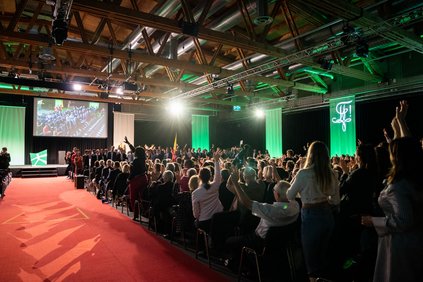Campus - 30.11.2021 - 00:00
Nobel Laureate Michael Spence at HSG
The UBS initiative "Nobel Perspectives" brought Michael Spence to St.Gallen to discuss the future of work and education.

30. November 2021. Almost 400 students and faculty attended “Nobel Perspectives”, a series of talks with former Nobel Prize winners in economics organized by UBS Global Wealth Management. The guests, which also included HSG Professor Beatrix Eugster, were introduced by Winfried Daun, the group head of advertising, brand strategy and media with UBS. Their mission with these talks is to make economics a topic that everyone can relate to.
Michael Spence, the Canadian-American citizen, is the former dean of the Stanford Graduate School of Business and is a professor at NYU Stern. In 2001, Spence’s research on markets with asymmetric information was recognized with the Nobel Prize.
The conversation started with Daun asking the distinguished guests how can diversity be reflected in education. Eugster focused on explaining some of her recent research which focuses on integrating children with disabilities into the classroom. She noted that doing so allowed different members of society to grow together, which ultimately could lead to more social cohesion.
Spence focused on the integration of AI and automation into the workplace. He noted that this will be a difficult transition, just as it was at the beginning of the Industrial Revolution and he believed that this would lead to more job augmentation, which is to say that manufacturing jobs, for example, would become less labour intensive and would have workers working side-by-side with machines.
Confusing times
The Nobel laureate also noted that our world is currently undergoing several revolutions at the same time, which makes things complicated. He mentioned that digital, energy and bio-medical transformations were tremendous advancements for our society but that these changes could in fact be some of the causes why we are seeing a polarization of views on Social Media and the spreading of conspiracy theories. He continued, saying that people who are influenced by conspiracy theories are in fact having an emotional response to change. He believes that by helping people and especially children question where they learned something, could lead to reversing this trend.
In the past six years, “Nobel Perspectives” has become the world’s largest video library of Nobel Laureate interviews and seeks to explore the questions that economists themselves seek to answer such as how can we fight global poverty? Or what is the future of work and education?
More articles from the same category
Discover our special topics











